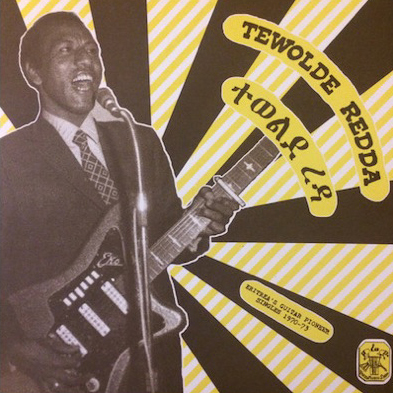Review May 26, 2017
Eritrea's Guitar Pioneer Singles 1970-73
The experience of getting this record in the Afropop office was one of escalating excitement: 1. It's exciting to receive vinyl (labels, take note!), 2. It's exciting when that record comes in beautiful packaging and most importantly, 3. Tewolde Redda is an utter pleasure.
Released by the record store and up-and-coming label Domino Sounds, Tewolde Redda Eritrea's Guitar Pioneer Singles 1970-73 delivers 10 tracks from the intersection of pentatonic, Eritrean folk music and Golden Era African guitar pop. The results are one part S.E. Rogie, one part Mulatu Astatke, full of handclaps and plenty of electric kirar—the East African lyre and a national symbol of Eritrea. Some songs sound like cross-continental cousins to contemporary Toureg guitar bands—almost trance-like explorations of a single chord. Others sound like 1950s pop and are some of the first Eritrean recordings to feature horn sections. Tewolde's warm, nimble voice pervades through it all.
Tewolde Redda was born in 1941, into an Eritrea that, along with Ethiopia, had just been liberated from Italian occupation that dated back to 1890. After the war, the Italians didn't all pick up and leave, and neither did the Allies. The British set up a temporary administration to decide Eritrea's fate, which ended up being annexation by Ethiopia in 1952, and a war for independence that would last until the '90s. The Americans set up a military and radio base in Eritrea's largest city (and eventual capital), Asmara.
Not a huge country, Eritrea is a unity of nine ethnic groups. It is located right at the intersection of so many worlds: Christianity and Islam, Africa and the Middle East. And the era that Tewolde was raised in was especially international even by these standards, and he grew up speaking four languages: his mother tongue Tigrigna, the Ethiopian state language Amharic, Italian and Arabic.
It was into this world—freshly post-colonial but with a re-emerging national identity being fought for, with foreign sounds of r&b and jazz and eventually rock 'n' roll in the air—that Tewolde's music emerged. The man himself worked as the musical director for the first-ever Eritrean-run theater in Asmara, which featured plays, songs, and stand-up comedy. He soon became the man to go to for arranging songs, and also for building electric kirars.
But it was hard to make money as a musician in Asmara, so Tewolde and a group of other Eritrean musicians left for Addis Ababa, the Ethiopian capital, in 1969. It was the same year that Philips and Amha Records began producing vinyl records in Addis. Tewolde played guitar in nightclubs, was an occasional roadie for Mulatu Astatke and helped produce fellow Eritrean artists. It was from this era and these labels that Domino Sounds assembled this compilation.
According to the thorough liner notes included here, most of Tewolde's songs are the standard pop song subjects: The first song's title translates to “Come close to me.” The second title asks “What would your mother say about me?” The references, compliments and come-ons, though, are culturally specific, inviting his beloved to climb a wanza tree and “fall in love in its top” or yearning for the Gamey hairstyle that young Eritrean girls wore in the country.
But Tewolde's mission was also one of national identity. “I performed with Mahmoud Ahmed, Tilahun Gessesse, and those guys...but I was never making music to become popular,” he says. “I was a revolutionary singer, singing for the love of my people and country.”
It may not be as obvious to us now, but his politics were clear enough to the Derg authorities who took over the country in 1974. Tewolde's ties to the Eritrean Liberation Front were discovered and the singer was forced to flee his homeland, ending up in the Netherlands where he lives today.
He says he still has a voice and still has songs to share, and says "one day I might give them to my people." Until then, there's a beautifully put-together compilation awaiting those who seek it.








